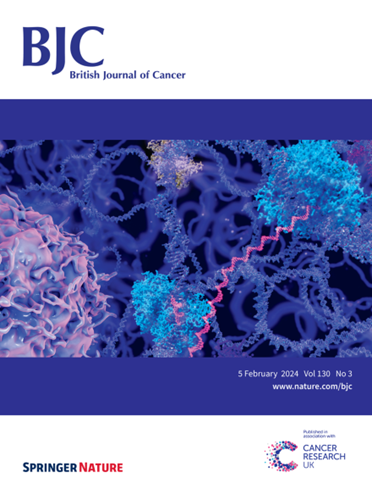早发转移性结直肠癌患者是一种独特的临床和分子现象。
IF 6.4
1区 医学
Q1 ONCOLOGY
引用次数: 0
摘要
背景:尽管儿童癌症的发病率和死亡率都有所下降,但最近的研究表明,早发儿童癌症(EO-CRC)的发病率有所上升。关于这种情况的数据很有限。我们的研究旨在评估转移性 EO-CRC 患者的临床和分子特征,以确定与晚发性 CRC(LO-CRC)对照组相比的差异:我们回顾性地收集了来自意大利 5 家不同机构的 1272 例转移性结直肠癌患者的数据。主要目的是评估 EO-CRC 患者与对照组患者的临床结果:结果:在总体人群中,EO-CRC 患者的生存期为 34.7 个月,对照组为 43.0 个月:研究结果表明,与晚期患者相比,早期结直肠癌患者的预后普遍较差。有趣的是,这种情况似乎与分子状态无关。这些观察结果可能会对临床实践和研究产生重大影响。本文章由计算机程序翻译,如有差异,请以英文原文为准。

Early onset metastatic colorectal cancer patients as a distinctive clinical and molecular phenomenon
Despite a reduction of both incidence and mortality from CRC, recent studies have shown an increase in the incidence of early-onset CRC (EO-CRC). Data on this setting are limited. The aim of our study was to evaluate the clinical and molecular profiles of metastatic EO-CRC patients in order to identify differences compared to a late-onset CRC (LO-CRC) control group. We retrospectively collected data from 1272 metastatic colorectal cancers from 5 different Italian Institutions. The main objective was to the evaluate clinical outcome for EO-CRC patients in comparison to patients included in the control group. In the overall population, mOS was 34,7 in EO-CRC pts vs 43,0 months (mo) (p < 0,0001). In the RAS/BRAF mutated subgroup mOS in EO-CRC pts was 30,3 vs 34,0 mo (p = 0,0156). In RAS/BRAF wild-type EO-CRC mOS was 43,0 vs 50,0 mo (p = 0,0290). mPFS was 11,0 in EO-CRC pts vs 14,0 mo (p < 0,0001). Findings indicate a general worse prognosis for patients with early-onset colorectal cancer compared to late-onset patients. Interestingly this seems to occur regardless of the molecular status. These observations might have a considerable impact on clinical practice and research.
求助全文
通过发布文献求助,成功后即可免费获取论文全文。
去求助
来源期刊

British Journal of Cancer
医学-肿瘤学
CiteScore
15.10
自引率
1.10%
发文量
383
审稿时长
6 months
期刊介绍:
The British Journal of Cancer is one of the most-cited general cancer journals, publishing significant advances in translational and clinical cancer research.It also publishes high-quality reviews and thought-provoking comment on all aspects of cancer prevention,diagnosis and treatment.
 求助内容:
求助内容: 应助结果提醒方式:
应助结果提醒方式:


